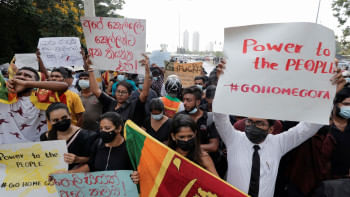Right to information at home and abroad

One of the reasons we write this column is to show our readers how people here and abroad make use of Right to Information (RTI) legislation. Today, we look at two examples each from Sri Lanka and Bangladesh. All four demonstrate the vast range of ways in which RTI can push for government transparency and accountability. The Sri Lankan examples show the use of the law at the state level, while the Bangladeshi examples show its use at the lowest level of administration.
A group of RTI activists in Sri Lanka asked the highest-level police authorities for information on detainees on remand under the Prevention of Terrorism Act. The activists wanted to know how many detainees were held, the condition of their mental and physical health, and how many were released without any charges. This application for information was refused. In October 2022, the Sri Lankan Information Commission directed the police to provide the information.
The police authorities had denied the request claiming that the release of the information would undermine the defence of the state, national security, or territorial integrity. The Commission, however, was incredulous as to how the requested statistical information (such as the number of arrestees, expectant mothers, individuals receiving treatment) could cause harm to the state. In regard to the detainees who were earlier released without charges, the Commission opined that, "If persons indicted under the Prevention of Terrorism Act are released, it is evident that such persons have not committed any offence; consequently, the release of information thereto cannot in any way endanger the defence of the State, national security or territorial integrity."
The Commission not only ordered release of the information within two weeks, but also warned the police that failure to comply would lead to prosecution under the RTI Act. The Commission could not have been more unequivocal.
The second Sri Lankan case involves one WKS Karunaratne. He asked Litro Gas, a leading supplier of domestic cooking gas in the country, for information on salaries the company paid its top management and the loans it provided them. The company refused to provide the information on grounds of exemption prescribed by the law, whereupon Karunaratne appealed to the Information Commission. He alleged in his appeal that disproportionate sums of money had been drawn by Litro Gas executives during the presidency of Gotabaya Rajapaksa, all while the company was charging Sri Lankan citizens exorbitant prices for its gas cylinders. The Commission directed Litro Gas to disclose the requested information, stating that since it related to the use of public funds, it was of public interest.
The Sri Lankan tales show how powerful RTI can be on matters of ethical, political, and economic concerns of society and the state.
The Bangladeshi examples we cite below are more mundane, down-to-earth, and elemental. They also underline the fact that RTI use in this country remains at that level and has failed to attract the attention of the elite, educated classes to achieve broader goals.
The first case was brought to our attention by RTI activists promoting the law at the grassroots level in Bangladesh.
Shamim Ahmed, from Moulvibazar sadar upazila, submitted an RTI request to the local union council asking for the list of persons who had been awarded old-age pension in the union, under the government's social safety net programme for the year 2020-21. Upon receiving the application, the secretary of the union council showed up to the applicant's home and scolded him for having the "audacity" to ask for such information. Shamim had to flee, and reported the incident to a senior member of his RTI group. The latter called upon the secretary and had to promise that Shamim would not pursue a formal response to his request. Unfortunately, such an outcome is not uncommon in Bangladesh.
But the next Bangladeshi example has a happier ending. In November 2022, an RTI applicant named Jahar Lal, also from Moulvibazar, wanted to know whether the Forest Department authority in Cumilla was aware of the damage caused to trees under its jurisdiction by the rampant nailing of posters on them. He reminded authorities that trees are living beings and can feel pain. Mohammad Ali, the concerned officer, agreed that the matter was indeed "inhumane" and promised to take proper action. Ali raised the issue to his colleagues and at a meeting on December 3, 2022, it was resolved that the department will ensure that trees in the district are properly protected and not subjected to such torture.
These four stories from two different countries demonstrate the unique power of the RTI Act to address universal concerns of citizens on matters of governance that affect their lives, whether individually or collectively. They also show how individuals or groups can come together and intervene to remind authorities of their responsibilities under the laws of the land, and how they too can benefit from transparency and accountability in their work.
Shamsul Bari and Ruhi Naz are chairman and assistant director (RTI), respectively, at the Research Initiatives, Bangladesh, RIB.

 For all latest news, follow The Daily Star's Google News channel.
For all latest news, follow The Daily Star's Google News channel. 










Comments